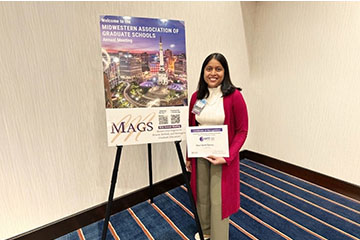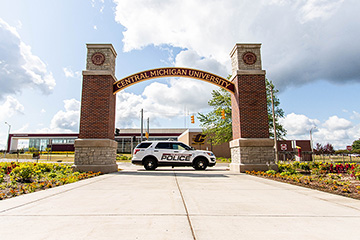Biology professor awarded 2024 President’s Award
David Zanatta, Ph.D., received the CMU 2024 President’s Award for Outstanding Research and Creative Activity for his work with mussels.
Biology professor, David Zanatta, Ph.D., received the CMU 2024 President’s Award for Outstanding Research and Creative Activity. This award can only be won once in a professor’s career at CMU and celebrates the success a senior faculty member has had throughout their time here.
Zanatta has published 67 peer-reviewed papers since 2002 and secured over $2 million dollars in external funding. Additionally, he has been cited more than 1,500 times, making him among the most cited researchers at CMU.
Zanatta’s research on freshwater mollusks spans his career, beginning with his master’s. As a focus of his research, Zanatta uses genetic and genomic tools to understand the evolution and ecology of mussels. Zanatta describes his research as a three-prong approach. He says, “First, is to broadly understand their diversity and their distribution and how they entered the Great Lakes region at the end of the last Ice Age. Second, we assess their status across riverscapes, the Great Lakes, and around the world. Third, we also use these tools to help protect and recover these extremely rare species.”
In his field, Zanatta is a highly regarded leader. In the research topic of freshwater mussels, CMU is ranked second among US academic institutions and seventh internationally, largely due to Zanatta’s and his closest collaborator’s, Daelyn Woolnough, Ph.D., research activities.
Zanatta has held various leadership positions in his field, including:
Associate Editor for Freshwater Science since 2013.
Elected Councilor-at-Large (2019-2022) for the American Malacological Society.
Member of the Mollusks Specialist Subcommittee for the Committee on the Status of Endangered Wildlife in Canada.
Co-chair of the Genetics Committee for the Freshwater Mollusk Conservation Society from 2017-21.
Integrated with his research, Zanatta mentors students from all academic levels with interests ranging from conservation biology to those with aspirations to go to medical school. Zanatta’s mentees are co-authors on peer-reviewed publications and present their research at regional, national, and international meetings.
On his mentorship, Zanatta says, “My ability to help facilitate and find the funding for students to do research and then mentor them through that scientific process, gives them an increased probability of success in finding careers in their desired in field.”
This story is brought to you by the Office of Research and Graduate Studies.




